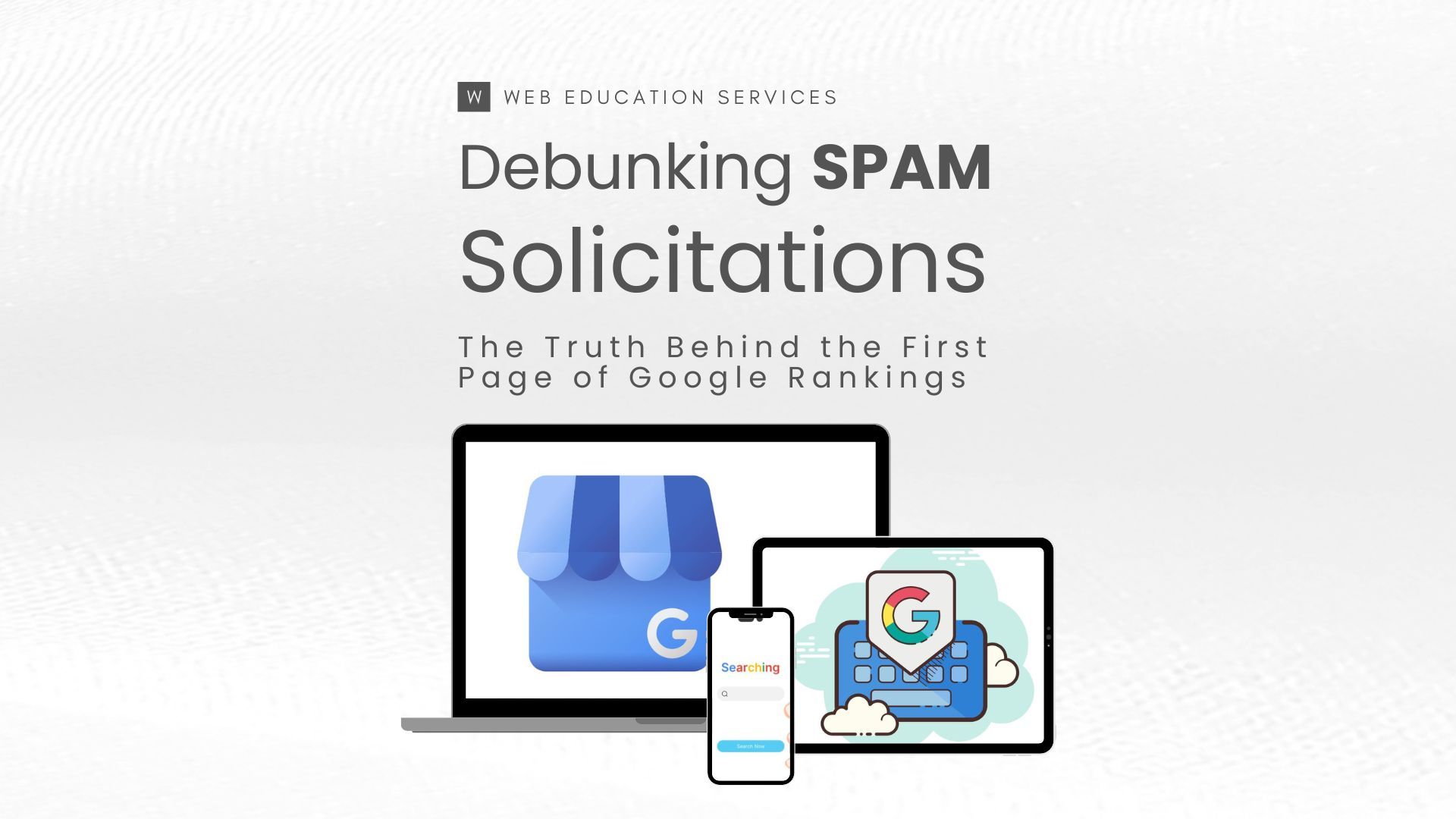Debunking SPAM Solicitations: The Truth Behind the First Page of Google Rankings

The internet is filled with SPAM solicitations claiming they can get your website to the first page of Google for specific key phrases. While ranking on the first page of Google may sound enticing, it's essential to understand that not all keywords are created equal. In this blog article, we will discuss the diversity of key phrases, the importance of context, the futility of ranking for keywords with no search volume, and the true meaning of success when it comes to Google rankings. We'll also delve into fat head keywords, the chunky middle, and long-tail keywords, which are crucial concepts to consider for an effective SEO strategy.
The Diversity of Key Phrases and How People Search
People search for information in various ways, using a wide array of key phrases. These phrases can range from specific long-tail keywords (e.g., "affordable SEO services for small businesses") to broad, more generic terms (e.g., "SEO"). It's crucial to recognize that the search intent and competition for each keyword can be vastly different, which makes a one-size-fits-all approach to ranking on Google ineffective.
- Fat Head Keywords: Fat head keywords are highly popular and sought-after search terms that users frequently input into search engines. These keywords generally consist of one to three words and attract significant traffic. However, their high competition level makes it challenging for smaller businesses and websites to rank for them. For example, in the travel industry, a fat head keyword might be "cheap flights" or "best hotels."
- The Chunky Middle: Chunky middle keywords find the sweet spot between search volume and competition. These terms typically comprise four to seven words and maintain a considerable search volume, while being less competitive than fat head keywords. This makes them an ideal target for businesses looking to enhance visibility without vying against industry behemoths. For instance, in the travel industry, a chunky middle keyword might be "affordable family vacation packages" or "best weekend getaways for couples."
- Long-Tail Keywords: Long-tail keywords are highly specific, lower-volume search queries that usually contain four or more words. Although these keywords have less search volume, they offer lower competition and higher conversion rates due to their ability to cater to users with a more defined search intent. For example, in the travel industry, a long-tail keyword could be "budget-friendly eco-resorts in Costa Rica" or "luxury boutique hotels in Paris for honeymooners."
The Importance of Context
Ranking on the first page of Google without considering the context of the keywords is meaningless. It's essential to understand the search intent behind each keyword and how relevant it is to your target audience. For example, if you're a small business offering SEO services, ranking for the keyword "free SEO tools" may not be helpful, as it doesn't align with your business's offerings or your target audience's needs. By focusing on context, you can identify the most valuable keywords for your business, regardless of whether they're fat head, chunky middle, or long-tail keywords.
Keywords With No Search Volume
While SPAM solicitations might promise to rank your website for specific keywords, it's vital to consider the search volume for those keywords. Ranking on the first page of Google for keywords with low or no search volume will not drive traffic to your website, nor will it help your business grow. Instead, focus on keywords with substantial search volume and relevance to your target audience. A balanced approach that targets fat head keywords, the chunky middle, and long-tail keywords will provide a more comprehensive SEO strategy, ensuring a steady flow of organic traffic.
The True Measure of Success: Traffic, Leads, and Sales
The ultimate goal of any SEO strategy should be to increase traffic, generate leads, and drive sales. The only way rankings matter is if they impact these metrics positively. To achieve this, you need to analyze your current traffic, understand how it converts to leads and sales, and optimize your website to improve upon this process. By concentrating on keywords that resonate with your target audience, such as fat head, chunky middle, or long-tail keywords, you can attract more qualified leads that convert better, ultimately leading to increased sales and revenue.
Understanding Google Analytics and Google Search Console
To accurately measure the success of your SEO efforts, you must familiarize yourself with Google Analytics and Google Search Console. These tools provide valuable insights into your website's performance, user behavior, and keyword rankings. By analyzing this data, you can identify areas of improvement and develop a more effective SEO strategy tailored to your specific goals and target audience.
- Google Analytics: This tool helps you track website traffic, monitor user behavior, and analyze the effectiveness of your SEO efforts. By understanding which keywords drive the most traffic and which pages have the highest conversion rates, you can make data-driven decisions to optimize your website for better results.
- Google Search Console: This tool allows you to monitor your website's performance in Google search results. It provides information on your website's visibility, indexing status, and any technical issues that may affect your rankings. Additionally, it offers insights into the keywords that drive traffic to your website, allowing you to fine-tune your SEO strategy further.
By leveraging these tools and understanding the data they provide, you can create a well-rounded SEO strategy that targets the right mix of fat head, chunky middle, and long-tail keywords to drive traffic, leads, and sales.
Your Site Isn't Ranking Well On Google
So, the next time you receive one of those lovely emails stating, "your site isn't ranking well," why not play a little game? Start by grilling them about key phrases – which ones they examined, how they plan to magically boost your rankings, and how they're quantifying their claims of "good" or "not good." Don't forget to demand context, too. But hey, let's be real – you're already on top of your game, measuring all these things and knowing precisely what's working, what's not, and how to elevate your site to new heights. So, maybe just chuckle at their audacity and hit "delete."
If you need some help reviewing your Google Analytics and reading your Google Search Console. Give us a call, 727.222.6984. We'd be happy to look over things with you. You can also get on our calendar by clicking here.







